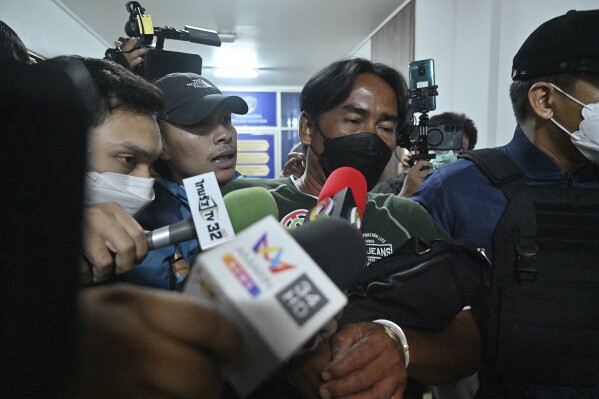
Police in Thailand said Thursday they have arrested three men they accuse of selling the handgun and ammunition used by a 14-year-old boy who allegedly killed two people and wounded five others at a shopping mall in Bangkok.
The shooting Tuesday at the Siam Paragon mall in the Thai capital has highlighted a gray area of the gun trade: the sale of handguns originally manufactured to shoot blanks but which can be modified to fire live ammunition. Thai police identified the gun used in Tuesday’s shootings as one of these so-called blank, or blank-firing, handguns.
Blank guns generally face fewer restrictions and can be imported and registered more easily than regular guns. What alarms law enforcement authorities in several countries, not just Thailand, is that such guns can not only be turned into lethal weapons, but also are harder to trace than real guns.
On Wednesday, a Thai police spokesman said 10,000 blank guns are in circulation in the country, and the authorities have announced plans to tighten controls, possibly including a ban on selling such firearms.
Press reports in the past year from South Africa, New Zealand and Britain cite those countries’ police officials expressing similar concerns about the increasing use of blank guns.
Blank guns have been openly advertised on sale on the internet, even on sites of major online retailers in Asia. In the arrests announced Thursday, the alleged suppliers were said to have been selling already modified guns.
Two men, a father and a son, were arrested in the southern province of Yala, and another man in Bangkok on accusations of possessing and selling illegal weapons, announced Noppasilp Poonsawat, deputy chief of Bangkok’s Metropolitan Police bureau.
They are suspected of selling a modified blank gun and bullets to the teenager who has been accused of carrying out the mall attack, which killed a Chinese tourist and a woman from Myanmar who worked at a toy store in the area.
The teen accused of Tuesday’s shooting has been sent to a juvenile detention center and his parents have not requested his release on bail, according to the Central Juvenile and Family Court.
The arrested men — Suwannahong Promkanajarn and Akarawit Jaithong from Yala, and Piyabut Pienpitak of Bangkok — have denied wrongdoing.
A police search of a house belonging to the men in Yala found blank guns, hundreds of blank bullets and gun barrels, Deputy Police Chief Noppasilp said. Police also found blank gun being carried by the suspect in Bangkok, and one in his office.
Police were led to the alleged sellers after searching the suspected shooter’s phone and finding he was in touch with them about a month ago, Noppasilp said. He said it appeared that they have been selling modified blank guns and bullets for a year or two.
Yala province in Thailand’s deep south, where the blank guns were alleged to have been modified, has for almost two decades been the the site of a violent Muslim separatist insurgency. Demand for arms there is especially high, and in the past the government has promoted the distribution of firearms to Buddhist residents arming themselves against the insurgents.
In Southeast Asia, Thailand is second to the Philippine in total and per capita gun-related deaths..
Gun laws in Thailand are relatively restrictive, but the country nonetheless has one of the highest levels of gun ownership in Asia, according to GunPolicy.org, a research project at Australia’s University of Sydney.
There are about 10 guns per 100 people in Thailand when including those owned illegally, as compared with less than one per 100 in the country’s peaceful Southeast Asian neighbor Malaysia, according to the organization.
Penalties for unlawful possession in Thailand include prison terms from 1 to 10 years and fines up to 20,000 baht ($539). There are strict licensing laws but critics say the registration process for firearms isn’t nearly tough enough.
___
Associated Press journalists Jutarat Skulpichetrat in Bangkok and Jintamas Saksornchai in Uthai Sawan, Thailand, contributed to this report




